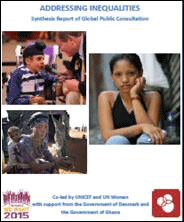Equality or poverty?
Published on Thu, 2013-02-28 17:53
For over a decade the debate, research and practice focused on extreme poverty. However, the key to the new development agenda could be somewhere else, much less illuminated by the political debate: inequality. This is what emerges from several months of consultations with academics and civil society organizations performed by the specialized agencies of the United Nations on women and children, UN Women and UNICEF. In Latin America this story is known as a tale of drunken and in the Middle East is attributed to the eccentric mullah Nasreddin Hodja. There once was a character who was looking for something in the town square. - Are you sure you lost your key here?, asks one of the spontaneous collaborators. - No. I lost in front of my house. - And, why are we looking for it at the square? - Because here there is light. Something similar may be happening in the global search for a new "agenda" to replace the Millennium Development Goals (MDGs) when they reach their expiry date in 2015. Since 2000, a set of eight MDGs aims at achieving concrete and measurable results. The first goal establishes that by 2015 the proportion of people living in extreme poverty, defined as an income below one dollar a day, will be reduced by half. The other seven set complementary goals in education, health and basic services. So, for more than a decade the debate, research and practice carried out by development agencies of the United Nations, government cooperation agencies of donor countries, governments of poor countries that receive aid and many NGOs concentrated in extreme poverty. And the debate on post-2015 agenda began by demanding more of the same. John Podesta, former chief of staff at the White House during the presidency of Bill Clinton and a member of the high-level panel that will recommend the UN a post-2015 agenda, says the priority now is to bring extreme poverty "to zero". British Prime Minister David Cameron, co-chair of the panel, wrote in the Wall Street Journal that "we now have within our grasp a unique opportunity to become the generation that eradicates absolute poverty". However, the key to the new development agenda could be somewhere else, less illuminated by the political debate: inequality. This is what emerges from several months of consultations conducted by the agencies specialized in women and children, UN Women and UNICEF, with academics and civil society organizations. The report was formally presented to the global leaderships on Tuesday, February 19 in Copenhagen by economists Jayati Ghosh, from Nehru University in New Delhi, and Sarah Cook, director of the United Nations Research Institute for Social Development (UNRISD). It claims that since the adoption of the Millennium Declaration (in 2000) many inequalities have worsened during a period in which the MDGs did not analyse trends beyond average numbers. And even when there has been rapid progress in the total values of human development, some inequalities have persisted or become more severe. In short, social outcomes cannot be separated from economic policies, said Cook, who claimed "transformative changes and not gradual increases" for "intertwined inequalities" as they result from marginality, ethnicity, disability or simply from being a woman. The Executive Director of UN Women, former Chilean President Michelle Bachelet, gave an example in the case of health, since how is it that "health funding (...) (goes)up and up, while funding for sexual and reproductive health remains flat and virtually stagnant"? According to Bachelet, inequality and discrimination should be a priority, but to focus on them can not mean to forget the inequalities between countries, which result from "structural drivers of inequality" enshrined in global governance, and she cited among them unfair global trade rules. Paul Victor Obeng, Minister of Development and Planning of Ghana, echoed: "The MDGs addressed the symptoms, post-2015 goals should address the causes". Tony Lake, UNICEF's Executive Director, argued that "inequalities undermine economic growth while social protection and universal services support it". Tackling inequality would be a "practical necessity as much as a moral duty". The Danish Minister of Cooperation, Friis Bach, meanwhile, insisted that the new objectives should "get to zero" (on hunger and poverty), but emphasized that they must be "universal", i.e. valid for all countries and therefore, considering relative and not absolute poverty. They should be also based on human rights, of which inequality is an "unacceptable denial". Tsikati Dzodzi, Professor at the University of Ghana, stressed that inequalities are a threat to national cohesion and should be addressed "because they do not correct on their own". Olav Kjorven, from the United Nations Development Programme (UNDP) and one of six high-level coordinators of the new agenda, announced in a tweet the main lessons he has drawn from the consultation: "Fair and redistributive taxes and accountability on the use of resources". The search begins to light up. Roberto Bissio See more information on the meeting on "Addressing Inequalities in the Post-2015 Development Agenda: Public Dialogue and Leadership". |
SUSCRIBE TO OUR NEWSLETTER



